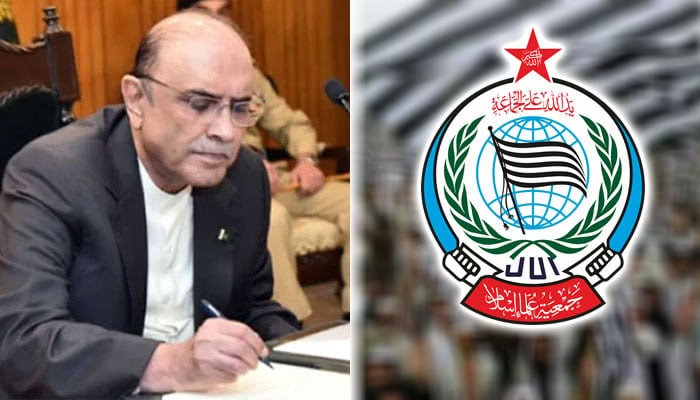The debate surrounding the Madrasa Registration Bill has taken a sharp turn as Jamiat Ulema-e-Islam (JUI) reacted strongly to President Asif Ali Zardari’s objections. The proposed amendment to the Society Registration Act, which aims to regulate the registration of madrasas, has raised significant concerns at both the national and global levels.
President Zardari’s Eight Objections
President Asif Ali Zardari has raised eight key objections to the Madrasa Registration Bill. According to sources, his primary concern revolves around the potential for global sanctions, including those imposed by the Financial Action Task Force (FATF) and the Generalized Scheme of Preferences (GSP).
The President argues that registering madrasas under the Societies Act could reduce legal oversight and create a system of arbitrariness. This lack of regulation, he believes, could jeopardize Pakistan’s international standing and lead to punitive measures.
Another objection raised by the President pertains to potential conflicts arising from the inclusion of religious education alongside fine arts under the Societies Act. He warns that such a combination might spark ideological clashes between groups with differing perspectives.
Risk of Global Sanctions
One of the most significant objections centers on the possibility of sanctions. The President expressed concern that implementing the Madrasa Registration Bill could lead to international scrutiny and sanctions. He suggested that members of the National Assembly should carefully consider global implications before drafting legislation related to madrasas.
Highlighting the specific challenges, the President pointed out that the Societies Registration Act of 1860 currently includes provisions for fine arts education, such as dance and art classes, but does not explicitly cover religious education. He believes this discrepancy could create legal ambiguities and conflicts if madrasas are registered under the same framework.
JUI’s Response to the President’s Objections
JUI spokesperson Aslam Ghauri criticized the President’s objections, calling them “surprising.” According to Ghauri, the objections were not submitted within the constitutional timeframe, raising questions about their validity. He alleged that the objections were raised in installments, which he believes undermines the constitutional process.
Ghauri also emphasized that the President’s objections were not directly sent to the Speaker of the National Assembly, as required by procedure. He argued that the objections that were forwarded to the Speaker had already been addressed, and therefore, no further objections should be entertained.
Lack of Solutions and External Pressure
The JUI spokesperson accused the Presidency of failing to provide concrete suggestions or solutions to accompany the objections. He noted that while the President raised concerns, no alternative approaches were proposed to resolve the issues.
Ghauri went on to suggest that the Presidency might be acting under external pressure, hinting at international influences shaping the objections to the Madrasa Bill. He questioned whether the concerns raised were genuinely rooted in national interest or driven by external agendas.
The Broader Implications of the Bill
The controversy surrounding the Madrasa Registration Bill underscores the challenges of balancing domestic policy with international obligations. Madrasas play a crucial role in Pakistan’s education system, providing religious education to millions of students. However, the lack of formal regulation has often been criticized, particularly by international bodies concerned with transparency and accountability.
The proposed amendment aims to bring madrasas under a formal registration framework, potentially improving oversight and ensuring compliance with national and international standards. However, critics argue that the current approach risks creating unnecessary conflicts and undermining the autonomy of religious institutions.
JUI’s Stand on Madrasa Registration
JUI has maintained that madrasas should be regulated in a way that respects their religious and cultural significance while ensuring compliance with state laws. Party leader Fazlur Rehman has previously stated that madrasas are willing to cooperate with the state but oppose any measures that undermine their independence.
Rehman has also warned against using madrasa registration as a tool to create divisions among religious scholars. He emphasized that the government should focus on fostering collaboration rather than conflict.
Way Forward
As the debate continues, it is clear that both sides need to find common ground to address the issues raised by the Madrasa Registration Bill. The government must ensure that the legislation aligns with international standards while respecting the autonomy and cultural significance of madrasas.
Meanwhile, JUI’s concerns about procedural lapses and external pressures must be taken seriously to maintain trust in the legislative process. The inclusion of concrete suggestions and solutions in future discussions could help bridge the gap between opposing perspectives.
The Madrasa Registration Bill has become a focal point of national debate, highlighting the complexities of balancing religious, legal, and international considerations. As the government and JUI engage in discussions, the focus must remain on ensuring transparency, compliance, and mutual respect. By addressing the concerns raised and finding a collaborative path forward, Pakistan can strengthen its education system while maintaining its global commitments.



